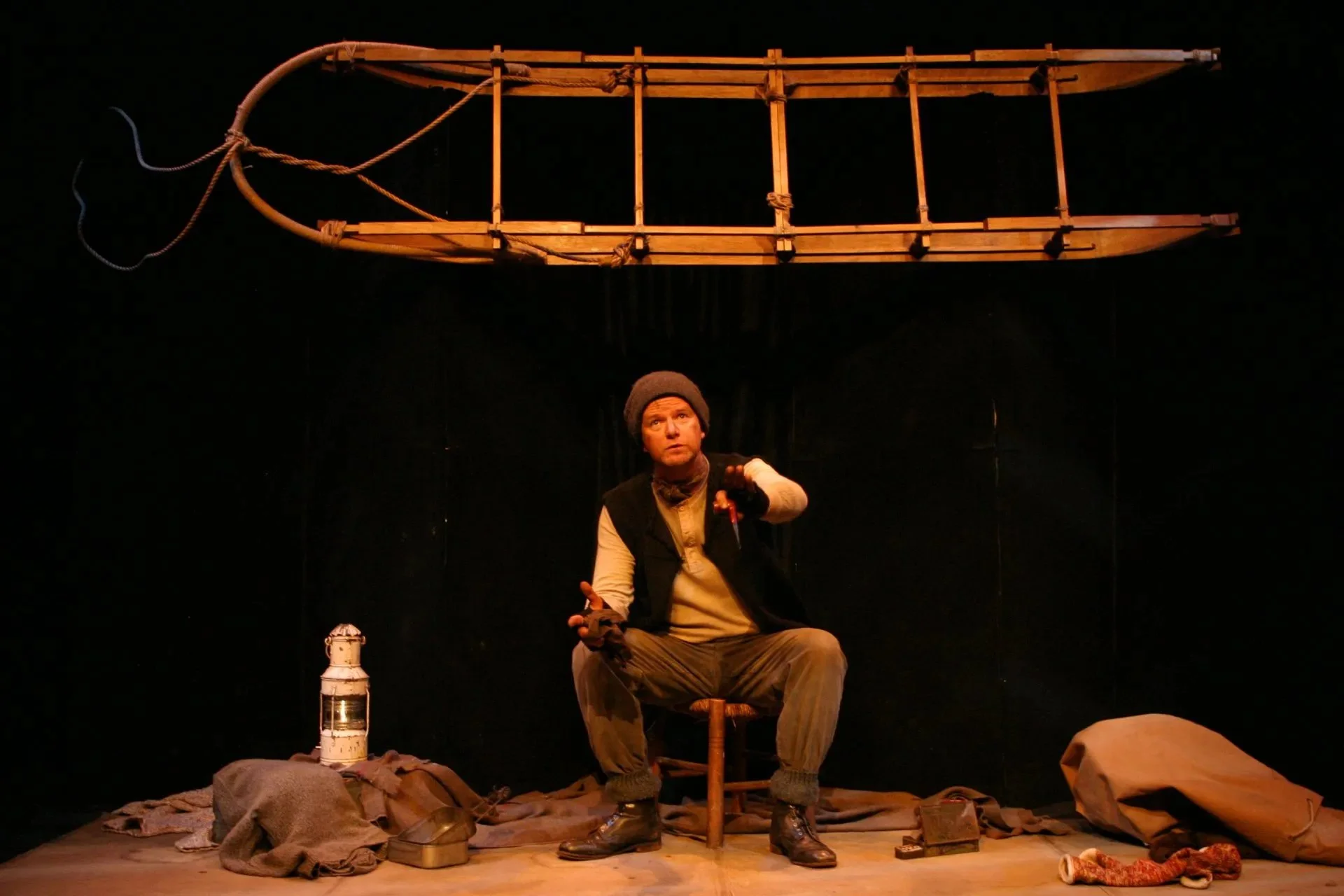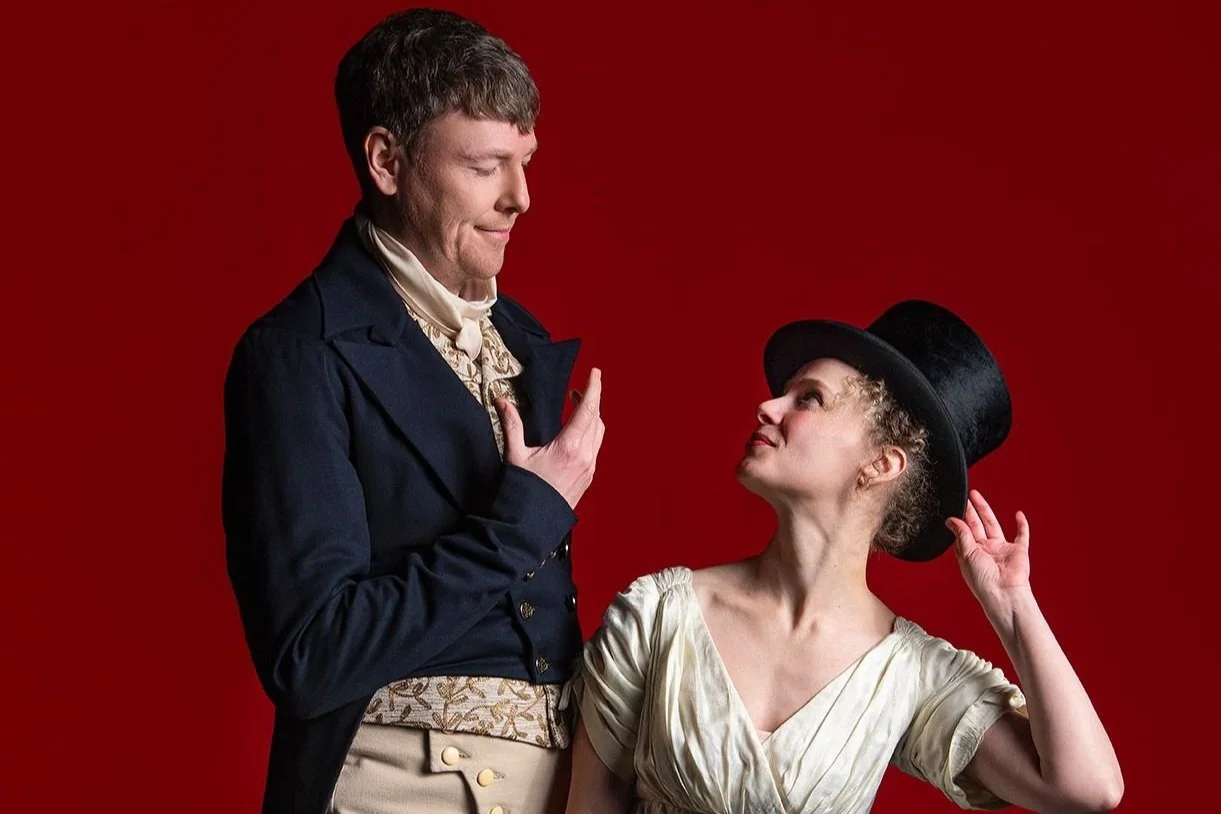Theatre review: Aidan Dooley channels Irish explorer's daring expeditions in Tom Crean—Discovering Antarctica
Solo show presented by Western Gold Theatre expertly unpacks a quiet hero’s achievements during British expeditions to Antarctica in the early 1900s
Aidan Dooley as the titular character in Tom Crean—Discovering Antarctica.
Western Gold Theatre in association with CelticFest Vancouver presents the Play on Words Theatre production of Tom Crean—Discovering Antarctica at PAL Studio Theatre to November 24
TOM CREAN’S STORY is packed with near-death experiences. During the course of three separate Antarctic expeditions, there were several moments in which he seemed mere inches away from the end. It’s tempting to think the Irish explorer had a kind of preternatural resistance to dying. In Tom Crean—Discovering Antarctica, a solo show built on the raw, oral accounts of his survival, theatre artist Aidan Dooley brings this elusive everyman figure to life once again.
There’s a kind of endurance on display that runs from the character to the actor himself. Dooley holds the stage alone for nearly two hours, a feat he’s been excelling at on tour for roughly the last 15 years. The Irish writer-performer channels Crean and his stories down to a science, knowing them backward and forward. For Dooley to have reached this point, the show itself has to hold up, and it does—capturing the remarkable life of this lesser-known figure and distilling his adventures into anecdotes that sound like they’re being told by a friendly bloke in the pub.
The late Irishman is a bit of a hidden figure in history books, a quiet hero who played a key role in three of the four major British expeditions to Antarctica over a century ago: Discovery (1901-1904), Terra Nova (1910-1913), and Endurance (1914-1916). Yet he’s rarely mentioned—perhaps, as he cheekily tells the audience, because he “never kept a diary”, unlike the more celebrated legends like Sir Ernest Shackleton or Captain Robert Falcon Scott. Instead, his legacy endured in the unrecorded moments of sheer survival and resilience against the Antarctic’s brutal conditions.
There’s a lot to soak in about those brutal conditions; Crean shows us the layers of clothing needed to survive, describes the endless white vistas and immense silences, and of course, recounts the punishing ordeals he and his fellow crew members went through on more than one occasion. Take, for instance, the time he had to strike out alone for 35 miles with only three biscuits and three pieces of chocolate in his pockets, walking nearly 20 hours to reach base camp and get help for two of his companions, one of whom was nearly lost to scurvy.
Crean talks about learning to tune his “inner clock”, much like a shepherd on the mountains, where days blur into hours. Watching Dooley re-enact all of this with just a few elements on a tiny stage, you can’t help but think of the actor’s own inner clock adjusting to the rhythms of the play. The physicality of it all is impressive—whether he’s on his feet explaining the dangers of crevasses, or sitting down to catch a quiet breath. The actor captures the frantic energy, the physical strain, the isolation, and in some moments, a sense of God’s presence in Crean’s life. Speaking to the audience at one point, he looks up and says “I’m telling you” as he points to the sky.
That’s not to say there’s a strong spiritual element or much of a dive into Crean’s psychology or motivations, however. A bit of backstory is sprinkled in here and there—like how he joined the British Navy before he was old enough (he lied about his age), or found himself remembering his mother’s no-nonsense advice whenever he faced impossible odds: “Get on with it!” Each detail is delivered with sharp Irish wit and an easy, unassuming charm.
Crean’s straightforwardness, as the play envisions it, brings an earnest honesty to the tales, making extraordinary experiences feel relatable and helping build that subtle tension between the personal and the historical. And though the show is affirming in this way, a quiet melancholy also slips through. Crean honours the crew members who never made it home, reflects on returning to Ireland only to face the same oppression (even after earning a British medal), and speaks about the men, not unlike himself, who were forgotten by history.
That subtle melancholy might also be intentional, or maybe not, in how it speaks to how far we are from the world Crean knew when he set out on these voyages. Early 20th-century ideals and myths around exploration might seem faded, understood through a different lens now, or mostly confined to space travel, the last untouched “frontier”. But the pull of the human spirit and the appeal of a good underdog survival story? Those are timeless. ![]()

























